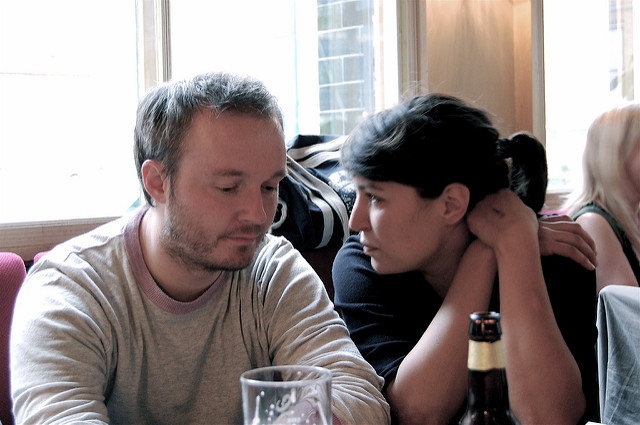Trying to be loving can hurt a lot when it’s not well-received.
When you want to do something nice for somebody and get shut down, it can feel disorienting or even infuriating. You’re just trying to help, so why are they reacting like that? And how is it possible that an act of love can backfire so much that it creates tension in the relationship?
Typically, this painful experience leads to one of two reactions: either we continue doing what we have been doing (likely with the same dismal results), or we decide that our loved one doesn’t deserve our care and give up. Whichever path we choose, we end up losing out.
However, we do have a better choice.
It just requires learning something that our culture never taught us: how to give love and care in a truly skillful way. It is this path that moves us beyond the dilemma of continuing to do something that is not working, or giving up on providing acts of love to those we care about.
The most important aspect of giving love and care in a skillful way is learning how to honor other people’s invitation. While I first learned about the concept of “honoring invitation” from my work with coaching clients, I soon realized that it applied to all types of relationships.
Simply put, if we give anything (such as advice, a hug, or a gift) and the other person doesn’t appreciate it, it is often because we have overstepped their invitation.
Each of the following principles can make us more effective at supporting people we care about, and sharing our love with them in a skillful way.
1. Become aware of invitation.
The first step in learning to honor invitation is to become clear on what that means. Typically, it’s easiest to notice when somebody else has overstepped our own invitation.
Assume, for example, that you are having the worst day in a long time. When interacting with others, you may be interested in having them compassionately listen to how you’re feeling. However, you may not be willing to have them try to change your perception, analyze the situation, or get you into a different mood.
In this situation, if someone were to simply listen to you, that person would give you an invited gift of their time and attention. If they started analyzing the situation, they would give you uninvited feedback.
When somebody oversteps our invitation, we may feel a sense of anger or frustration. We might also not feel heard or seen. Whatever the exact reaction is, it generally doesn’t feel good. No matter how positive our intentions are, we end up creating a similar reaction in others when we overstep their invitation.
2. Ask for permission.
The easiest way to make sure our act of love and care is an invited gift is to ask the other person for permission. For instance, I sometimes ask both coaching clients and friends or family members: “Would it be okay if I ask you some questions?” or, “Would you like my feedback on this?”
When asking for permission, it’s critical to be non-attached to the answer. Our being okay with receiving a “no” gives the other person space to be honest about their feelings. Otherwise, the person may give us the answer they think we want to hear. If they say “no,” we can simply follow up with another question: “So what could I do that would be helpful for you?” Sometimes the answer can be quite surprising.
3. Ask questions.
We often think that it’s important to have the answers. However, great questions are typically much more powerful because it empowers people to find their own answer.
I once got to participate in an exercise designed to demonstrate the power of great questions. In this exercise, the only thing we were allowed to do to help someone in our group was to ask them questions. To make sure the questions were worth asking, we could only speak if it would “improve upon the silence.” The result was that everybody created unusually deep breakthroughs in a brief period.
What questions are appropriate to ask our loved ones depends on the situation. Generally, we should avoid asking leading questions. A few examples of potentially helpful questions are: “What would your ideal outcome in this situation look like?” “Have you ever felt this way before, and if so, what did you do to overcome this?” “Is there anything you could learn from this?”
4. Check your perception.
We often assume that we know how somebody else is feeling. However, our perception of their inner landscape could be way off. And falsely assuming that we know how someone else feels can lead to tensions in the relationship.
Thankfully, there is an easy cure for that. We can repeat back to the other what we heard them say, or what we observed in them. Then we ask if our perception is right. This gives our loved ones the chance to correct us.
To check our understanding of what a friend said, we might ask: “What I heard you say is that you are frustrated because your partner didn’t listen to you when you went on that trip, and you are feeling disrespected because of it. Is that correct?”
If we want to make sure that we observed our loved one’s situation accurately, we can ask: “It seems to me that you are overwhelmed because you are handling a number of projects at work and also need to take care of your parents. Is that true?”
The more we practice these steps (while also being kind to ourselves), the more we learn to effectively give love and care to others.
The Beatles taught the world that “All You Need Is Love.” I would like to add that having some skills also really helps.
~
If you liked this article, I also invite you to check out my free love and romance call here. ~
~
~
Author: Bere Blissenbach
Image: Flickr/Iain Farrell
Editor: Travis May
 Share on bsky
Share on bsky




Read 10 comments and reply